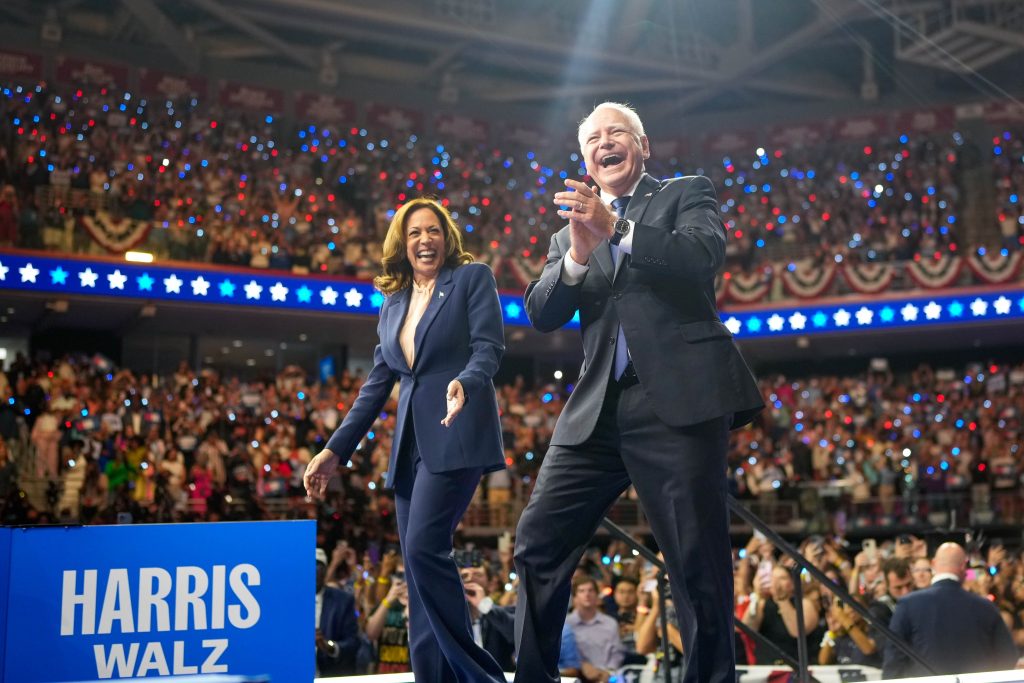Podcast: Play in new window | Download | Embed
Tribal advocates and communities across the United States are excited that with Gov. Tim Walz (D-MN) being picked as Vice President Kamala Harris’ running mate, this could lead to his lieutenant governor making history.
If the Harris-Walz ticket is victorious in November, the succession plan would elevate Lt. Gov. Peggy Flanagan (White Earth Band/D-MN) to become the state’s first Native American and first woman governor.
Lt. Gov. Flanagan has been a vocal advocate for improved relations between the Minnesota government and the eleven tribes contained within its borders.
She successfully pushed for the state flag redesign, saying elements depicting a Native American and settler were racist and inaccurate. And she also created the first Missing and Murdered Indigenous Relatives office in the U.S.
The New York Times notes that if Lt. Gov. Flanagan becomes governor, Bobby Joe Champion – currently president of the Minnesota Senate – would take her spot, making him Minnesota’s first Black lieutenant governor.
I’ve been friends with Tim Walz for almost 20 years. And for more than five years, he’s been my partner in justice at the Minnesota Capitol.
He has the grit and the grace to keep our country moving forward alongside Kamala Harris.
Let’s get @KamalaHarris and @Tim_Walz elected! pic.twitter.com/3QN829Kplo
— Peggy Flanagan (@peggyflanagan) August 6, 2024
Gov. Tim Walz himself has been a supporter of tribally owned and operated cannabis operations across his state.
“Think it’s a great day for cannabis supporters as a whole. Governor has been very supportive, as well as the lieutenant governor, here in Minnesota as far as getting the cannabis program up and runnin’.”
This includes Waabigwan Mashkiki of White Earth, Minn. Zach Wilson is its CEO.
He says he and other advocates would appreciate the legalization of cannabis at the federal level some day.
“Whoever’s there left or right, there’s always hope for support and I think there is quite a bit of support from Gov. Walz already, so hopefully that would transition to federalization as well.”
Cannabis grows and product development is seen as an economic driver for tribes.
Wilson says Waabigwan Mashkiki is doing well into its first year of operation.
“Going through an expansion right now, on many levels as far as indoor-outdoor extraction, processing. So got a lot of moving parts there. We’re currently employing well over 50 tribal members that live on the reservation in White Earth.”
Election Day is November 5.
Kamala Harris and Tim Walz are the Democratic Party’s candidates, while Donald Trump and his running mate, J.D. Vance, make up the Republican ticket.

Native children at the Teller Institute in Grand Junction, CO. (Courtesy Museum of Western Colorado)
A new state law takes effect Wednesday that funds research into nine Colorado boarding schools where Indigenous children were forcibly relocated.
KUNC’s Emma VandenEinde has more on how researchers plan to address this traumatic legacy.
History Colorado will use $1 million to visit sites and meet with representatives from more than 30 tribal nations – as well as students who attended the schools.
The goal of the three-year project is to get recommendations on educational opportunities and how to support affected families.
History Colorado now has the resources to go beyond existing documentation, which has incomplete and inaccurate accounts of the atrocities.
U.S. Sen. John Hickenlooper (D-CO) spoke on the Senate floor recently about the history of Fort Lewis Boarding School.
“Superintendent Breen was known for sexually abusing his young female students. When the girls became pregnant, school officials made sure that they ‘disappeared’.”
Sen. Hickenlooper is backing a national bill to create a federal commission to examine the Native American boarding school system.
The Department of the Interior also released its second report on the schools, recommending the federal government to apologize and acknowledge its complicity.
Get National Native News delivered to your inbox daily and stay up-to-date on the 2024 Native Vote. Sign up for our daily newsletter today.



